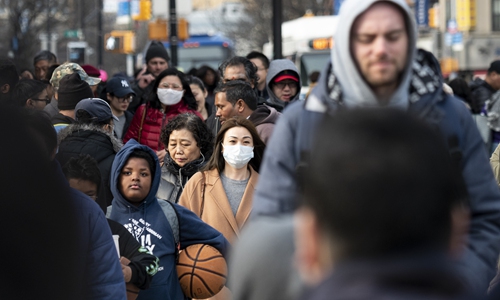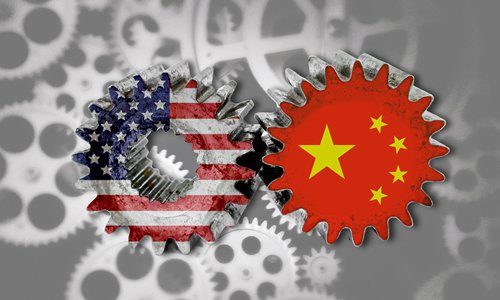
People wear face masks as they walk down a street in Flushing area of Queens on Monday in New York City. Photo: AFP
Combating the wildly spreading coronavirus over the world shall top the agenda for both the Chinese and the US government, even as US President Donald Trump indicated the two countries to launch phase two trade negotiations on Friday, a Chinese observer said on Saturday.
US President Donald Trump said on Friday that "we will start negotiating [on phase two trade talk]," after declaring a national emergency to help combat the rapid spread of COVID-19 across the country.
Commenting on the development, Chinese observers said while it is possible that some formalities will occur, there is little significant progress to be expected from the phase two trade talks, as both governments are currently preoccupied with containing the virus outbreak.
"These efforts alone will consume the two governments' attention for at least three to four months, and then President Trump will have to focus on his reelection campaign," said Liang Haiming, dean of the Belt and Road Institute at Hainan University, who follows the China-US trade talks closely.

China US Photo: GT
China has always been a hot topic during US election years, but, very often, no measures of significant nature will be taken against China, Liang suggested. "Because if the White House provokes a fight, and China retaliates, it will definitely worsen the US economy now reeling from the impact of the COVID19."
As the epidemic weighs down on both economies, voices from both China and the US are clamoring for outright removal of all the tariffs the Trump administration imposed on Chinese imports in order to shore up trade and businesses.
Conducting phase two trade talks will call for the two countries' negotiators to meet in person, which is difficult to materialize as the coronavirus is assaulting both countries, Chinese analysts say.
US Treasury Secretary Steven Mnuchin reportedly said on Friday that the Trump administration is not considering broad tariffs relief on Chinese imports so as to ease its economic pain from the coronavirus. The administration did, however, erase tariffs on a number of medical products made in China.
Liang predicts that both governments would be forced to focus on shoring up domestic investment and consumption to drive their economies, once the pandemic is finally brought under control.
China and the US signed the phase one trade deal on January 15 after almost two years of painstaking trade fights and negotiations.
